-
According to a report by Fortune Business Insight, the gaming market will reach $545.98 billion market by 2028 due to the involvement of metaverse, non-fungible tokens, and more. The enormous growth of this sector is paving the way for new business opportunities and innovations. NFT development is one such innovation in the gaming industry. Gaming NFTs can become popular in the near future as they give players opportunities to buy and sell their in-game assets. Here, a gaming NFT marketplace provides a platform for buying and selling gaming NFTs. This article gives an overview of this platform, its crucial features, revenue model, and more.
Gaming NFT Marketplace
Similar to the traditional NFT marketplace, a gaming NFT marketplace enables the selling, buying, and trading of non-fungible tokens (NFTs). Developers specifically design these NFTs for gaming assets.
This marketplace enables players and developers to earn money while playing games. Its underlying technology, i.e., blockchain technology, gives owners complete ownership of their gaming assets. It ensures decentralization, meaning that owners will get the power to decide the price of their gaming assets.
This marketplace enables minting and trading various game assets, including cars, costumes, player cards, jerseys, warriors, virtual lands, and more. The platform enhances the game-playing experience by letting users mint NFTs for unique collectibles.
The gaming NFT marketplace integrates the growth and potential of gaming. It has the potential to generate huge revenues and transaction volumes.
This market is considerably more decentralized and secure. So, the marketplace is less likely to collapse.
Suggested Read: Game Development with NFT | Things You Must Know
Gaming NFT Marketplace Features
The following are the must-have features of a gaming NFT marketplace:
Buy
Customers can use a fixed-buy framework to buy an NFT in the gaming NFT marketplace. The process involved in direct buying and selling is simple. But unlike traditional e-commerce, the development process of creating this feature requires smart contracts.
Auction
The auction feature can help sellers get the best prices for their gaming NFTs. A timed auction can increase an NFT price with more competition.
A marketplace must provide real-time data of bidding during the auction. So, it requires complicated back-end work.
Interoperability
A gaming NFT marketplace must support NFT games that are made on multiple blockchain platforms. It must allow the selling, buying, and trading of gaming assets of games build on different blockchains. These interoperable NFTs of various games attract versatile users to the platform.
Secondary Sale
A gaming NFT marketplace should allow the selling and re-selling of gaming NFTs. So, the marketplace must enable the functioning of secondary sales without faults. These sales can draw the attention of new users and retain long-time traders and investors.
Security Protocols
Gaming NFT marketplaces can employ various security measures to avoid security threats, including phishing attacks and hacking. Some measures include whitelisting, two-factor authentication (2FA), auditing, multi-signature transactions, cold storage, and more.
Additionally, businesses can use anti-DDoS (distributed denial of service) and other preventive technologies to provide a secure decentralized network.
Explore: NFT Marketplace Development for the Digital Age
Trending Metrics
A gaming NFT marketplace must have the feature of trending metrics. This feature enables people to search for the top trending NFTs on the platform. It will ease the process of buying gaming NFTs.
Modifiable Storefront
A customizable storefront can attract more visitors or potential customers. Businesses can integrate NFT details like names, bids, previews, and rates in the storefront to make it informative. It will make the storefront attractive and detailed.
Businesses have to modify the backend of the gaming NFT marketplace to customize their storefront.
Status of Listing
The status of the listing provides an idea to the sellers about the gaming NFT. It may include the number of people who have viewed the file and bid in the auction. Marketplaces may show the verification status of an NFT so buyers can make a wise decision.
Additionally, sellers may get a notification after getting an offer for their gaming NFTs.
Filters
Filters improve the user experience while searching for gaming NFTs. Some people buy NFTs as an investment while others like to collect gaming NFTs. Both investors and collectors have different criteria for searching NFTs in the marketplace.
So, providing categories like price, rarity, collections, and status in the marketplace enable people to sort out items. Filters will let users browse the gaming marketplace by their specific attributes, popularity, price, rarity, and more.
Multiple Payment Options
Multiple payment options can simplify buying, selling, or trading processes. You can add off-ramp and on-ramp solutions to facilitate a seamless flow between cryptocurrencies and fiat currency.
Check It Out: It's Time for Real Estate NFT Marketplace Development
Revenue Model
Businesses offering gaming NFT platforms can generate revenue using various strategies:
Transaction Fee
Businesses can charge transaction fees to users when trading on their NFT marketplace. Moreover, NFT assets are significantly more expensive than traditional games. So it can generate huge revenue.
Registration Fee
Another strategy may include charging a one-time fee to users for setting up their accounts. Also, platforms can charge a fee to get accessibility to a user's NFTs.
Also, Visit: Play-to-Earn NFT Games | Fundamentals and Development Essentials
Gaming NFT Marketplace Development
With the growing popularity of the gaming NFT marketplace, more and more people are showcasing their gaming NFTs in these marketplaces. This growth is also leading to the development of such marketplaces.
However, not every business has expertise in building a gaming NFT marketplace. So, they require the assistance of blockchain service providers.
Oodles Blockchain can be the ideal solution partner for your gaming NFT marketplace development. Our NFT developers can assist you in getting the required services. Contact us today to get started.

Our Offices
INDIA
Emaar Digital Greens, Sector 61,
Gurugram, Haryana
122011.
Welldone Tech Park,
Sector 48, Sohna road,
Gurugram, Haryana
122018.















